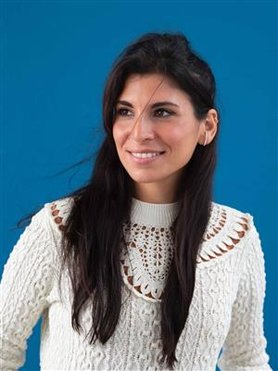

S. (Salua) Hamaza
S. (Salua) Hamaza
Profiel
Expertise
Research interests are in two main areas:
aerial physical interaction and
embodied intelligence in aerial robots. Salua is interested in the design and morphology of interacting aerial robots, and their implications in flight performance and autonomy. Types of aerial interaction tasks include: manipulation, placement of objects in the environment, dynamic grasping, perching, locomotion.
Recurring themes are mechanical compliance, design of actuators, compliant control theory, kinematics and dynamics of multi-DoFs mechanisms for aerial robots, bio-inspired morphology & sensing, soft manipulation.
Biografie
Prof. Salua Hamaza is Assistant Professor in Aerial Robotics & Director of the BioMorphic Intelligence Lab at TU Delft, Netherlands. She is also Research Fellow at Imperial College London, Aerial Robotics Lab. Her research focuses on the development of compliant aerial robots capable of interacting with objects and the environment for manipulation (primarily), and locomotion. Her robotic solutions take inspiration from biological systems for flying and interaction tasks, leveraging compliance in hardware and software to advance aerial robots’ autonomy.
Previously, she was a post-doctoral researcher at the Aerial Robotics Laboratory, Imperial College London, United Kingdom. She obtained her Ph.D. in Robotics and Autonomous Systems from Bristol Robotics Laboratory, University of Bristol, in 2019. She was visiting researcher at the GRVC at University of Seville, Spain, during 2018. Prior to the PhD she was researcher at RAM at University of Twente, Netherlands. She received the MSc degree from the University of Bologna and TU Delft.
Check out my publications on:
Awards
- Best Paper Award - IEEE International Conference on Intelligent Robots and Systems (IROS) 2022 Workshop on Robotics for Nuclear Environments Exploration and Decommissioning: Challenges and Emerging Techniques;
- Best Paper Award, finalist - IEEE International Conference on Intelligent Robots and Systems (IROS) 2020 Workshop on Perception, Planning and Mobility in Forestry Robotics;
- Best PhD in Robotics in the UK Award 2019, 3rd prize;
- Best Paper Award in IEEE Robotics and Automation Letters, awarded at IEEE International Conference on Robotics and Automation (ICRA) 2017;
- Patent: Manipulation Control System (inventor). Filed by the University of Bristol (UK) 2017.
Expertise
Publicaties
-
2024
A Biomorphic Whisker Sensor for Aerial Tactile Applications
Chaoxiang Ye / Guido De Croon / Salua Hamaza
-
2024
A Low-cost Fabrication Approach to Embody Flexible and Lightweight Strain Sensing on Flapping Wings
S. Wang / M. den Hoed / S. Hamaza
-
2024
A Morphing Quadrotor-Blimp with Balloon Failure Resilience for Mobile Ecological Sensing
Suryansh Sharma / Mike Verhoeff / Floor Joosen / RR Venkatesha Prasad / Salua Hamaza
-
2024
ALBERO
Agile Landing on Branches for Environmental Robotics Operations
Liming Zheng / Salua Hamaza -
2023
ADAPT: A 3 Degrees of Freedom Reconfigurable Force Balanced Parallel Manipulator for Aerial Applications
Kartik Suryavanshi / S. Hamaza / V. van der Wijk / J.L. Herder
-
Media
-
2024-02-05
SHErobots: Tentoonstelling en evenementen
Verscheen in: TU Delft
-
2023-12-15
VOGEL OF DRONE?
Verscheen in: Delft Matters
-
2023-09-15
AI #3: Is it a bird? Is it a drone?
Verscheen in: TU Delta
-
2023-08-03
NWO VENI 2022 Winner
Verscheen in: NWO
-
2023-08-21
NWO VENI grant for ‘Aerial Robots in a Tangible World: Drones with the Sense of Touch Act upon Their Surroundings’
Verscheen in: TU Delft
Prijzen
-
2023-8-3
Veni grant AES 2022
Luchtrobots in een tastbare wereld: Drones met tastzin handelen op hun omgeving
Drones zijn tot nu toe vooral “ogen in de lucht”. Om echter het volle potentieel van drones te benutten zal het nodig zijn dat ze ook fysieke interactie hebben met hun omgeving. Daarom zullen in dit project drones worden voorzien van het zintuig van tast, waarbij de focus niet alleen ligt op de bediening van ledematen, maar juist ook op het soepele en zachte ontwerp hiervan. Hierdoor worden drones slimmer op lichaam- en sensorniveau, en kunnen ze zich beter redden in moeilijke situaties, bijvoorbeeld in rokerige of donkere omgevingen in een brandend gebouw, dankzij de mensachtige tastzin.
-
2023
Luchtvaart in Transitie Grant
Interacting Drones and Augmented Reality Technologies
-
2023
NWO VENI 2022 Grant
Nowadays, drones are mainly used as 'eyes in the sky'. Yet, they are the only robots incapable of physical contact. While it is exactly through physical contact that we, humans, manipulate objects and the surroundings to create, and give shape, to our world.
To utilise the full potential of drones, they can be provided with the sense of touch and facilitate a number of tasks for our society: from maintaining infrastructure assets at height, to helping ecologists with data gathering in vast forest areas, to exploring new terrains and environments inaccessible to humans. To achieve this, I will implement new designs of aerial robots that exploit mechanical compliance to achieve physical interaction with their surroundings. Such designs will be complemented by novel interaction control algorithms that rely on richer information on the sense of touch, so to realise safe and reliable operations in the real world. Thanks to this project, drones will be able to finally deliver a tangible impact in our society.
-
2022
Best Paper Award - IEEE Robotics and Automation Society
IROS 2022
-
2022
TUDelft AI Lab Grant - BioMorphic Intelligence Lab
Biologically Inspired Solutions for Aerial Robotics
Nevenwerkzaamheden
-
2023-09-01 - 2025-09-01